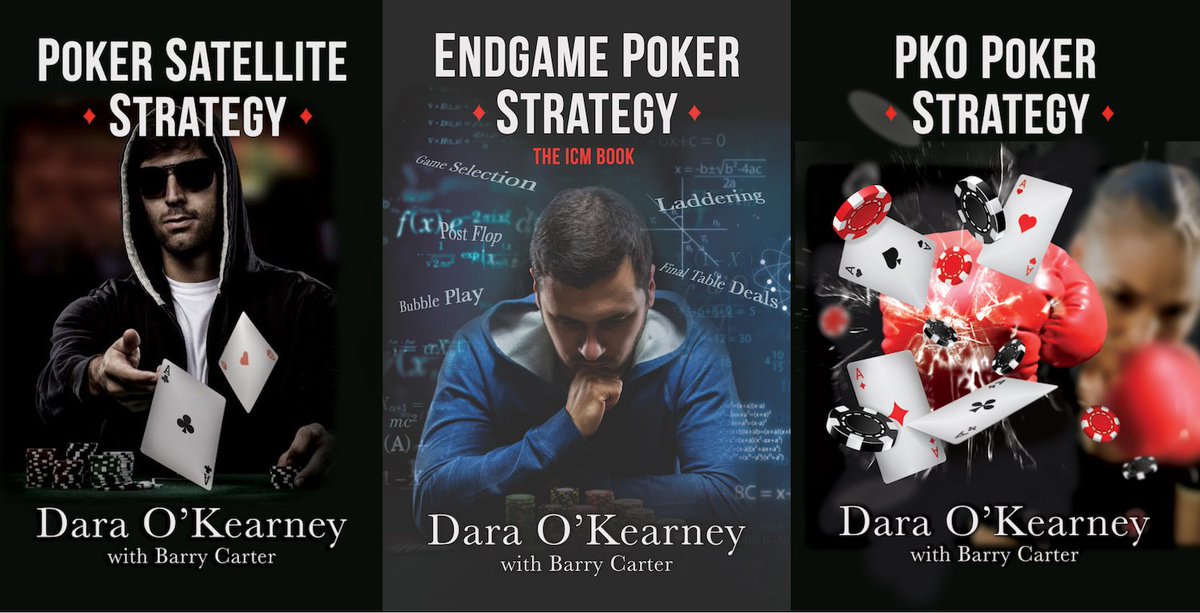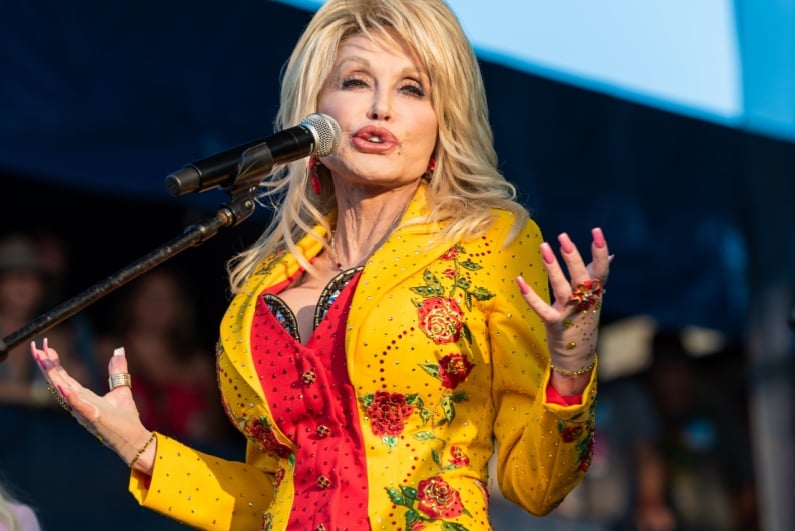ICM no longer forgotten
Most people who learn poker today don’t realize the importance of understanding ICM until they make a really costly endgame mistake.
If a player makes a horrible river call in level one of a 3,000-runner field, it might cost them 10% of their 200-big-blind starting stack, translating to less than 10% of the buy-in. If that same player makes a call that is just one pip too light with six left on the final table of that tournament, it might cost them ten buy-ins. That click of the mouse or announcement of “call” could be the biggest mistake of their poker year.
Acclaimed authors Dara O’Kearney and Barry Carter believe that ICM became something that much of the poker world forgot about. That is why they turned their attention to this crucial concept for their latest book, Endgame Poker Strategy: The ICM Book, which came out on Wednesday.
the deepest dive that poker literature has ever taken into the subject
Explaining complicated ideas in an easy-to-digest way is their forte, and this book is perhaps their greatest exemplar of this. Attempting the deepest dive that poker literature has ever taken into the subject, they have created a book that will pay for itself tenfold if it prevents the reader from making one big ICM mistake.
Last month, VegasSlotsOnline News leaked a section of the book. Luckily, O’Kearney and Carter have forgiven us, so this week we sat down with them for a chat about the writing process, their motivations, and the final product.
Dara, in the most recent episode of The Lock-In, you referred to Jared Tendler as your Eskimo brother, implying that you have both had your way with Barry. They only collaborated on two books, but you guys have done three; plus I know number four is in the works. Would you ever share him with anyone else or is he monogamously yours now?
Dara: Well, I don’t want to brag, but since hopping into bed with me to produce Poker Satellite Strategy, he’s been very faithful. And long may it continue! Also, who else would want him at this point?
Barry: Jokes aside, I like working with Dara because I learn a lot and we are pretty productive together. We already have probably three other book ideas. That said, I would one day like to attempt a third book partnership with somebody, to see if I genuinely have a talent for co-authoring or if I just got lucky with my last two co-writers.
This is your third book, and your third to hit number one in the Amazon charts. How important is the Amazon model for producing niche books like this and actually making it worthwhile for the authors?
Barry: It’s not possible without Amazon. We all have our issues with Mr Bezos, but what Amazon has done to empower self-published authors can never be understated.
If you are media savvy and willing to put the work in, like most poker players are these days, it’s not only easy to keep up with traditional publishing, but sometimes you have an advantage. We can undercut traditional publishers on price, for example, because we get a bigger percentage of the profits. We also don’t have to spend money on storing pre-printed paperbacks in warehouses. Even though Amazon has caused us the biggest-ever headache by not printing in Ireland, we are really thankful for them.
Dara: This is more Barry’s area of expertise, so I don’t have much to add except to say I love the fact they have sales charts so you can see how your book is doing relative to others. I have had a lifelong love of numbers and rankings. I grew up not only wanting my football club to be number one, but all my favorite singers, movies, and everything else that gets ranked. I used to compile Bowie chart numbers for his website, but this is even better because I have an actual involvement.
Did I keep clicking refresh on Amazon until the book was number one? Did I then send “in your face” messages to Brokos and Konnikova immediately once it was? Do I do this every day? The answer to all these questions, sadly, is yes. Except the last one – it’s only most days.
Well, there’s a lot to follow up on there. I’ll start with your reply, Barry. You mentioned not being able to get the book printed in Ireland. I know that’s a particular hassle because you have a book launch planned for Ireland. Can you tell us about that?
Barry: I guess I’ve been fortunate that this has been the first time Brexit has affected me so far. We didn’t realize that Amazon has all but stopped shipping from their UK site to Irish customers since the start of Brexit. Why they don’t have an Amazon.ie site is beyond me. Irish customers can still get things relatively easily, including our books from the French Amazon.
It means we are having to think on our feet. The Irish poker market is small, but it’s our most loyal market because Dara is a big name there. They might make up a small part of our sales, but Irish players have been the cheerleader for the last two books. Early sales beget more sales on Amazon, as do good reviews, and we owe that to the Irish poker community. So we are coming up with some alternative ways for Irish players to get the paperback, including (hopefully) at the IPO, the first major post-lockdown Irish poker tournament.
Dara: Yeah, I’ve been completely overwhelmed by the support of the Irish poker community. I couldn’t believe the reaction to the first book at the Irish Open that year, with so many people wanting a signed copy and passing on their congratulations. Similarly, they’ve been our most loyal Chip Race supporters even as we have expanded our focus outside Ireland. After we won our GPI award – sorry, my GPI award (you’re still not getting your hands on that, Lappin!) – I was overwhelmed by the number of people I’d never have imagined paid attention to podcasts who came up to say well done.
The only downside is that I spent most of the release day this time getting messages from Irish people saying “Why can’t we buy it?” and shouting at Barry: “WHY CAN’T IRISH PEOPLE BUY IT??? IS IT BREXIT??? DID YOU VOTE FOR BREXIT BARRY???? WELL, DID YOU????”
Barry: For the record – no.
Picking up on your last point from the previous question, Dara. You referred to Andrew Brokos and Maria Konnikova. You have a healthy rivalry with both. Is it true that Maria eliminated you from the last tournament you played in Vegas? Does that mean her poker book is better?
Dara: What kind of question is that? Of course it means her book is better, duh! Maria is a superior version of all of us in every way.
I’m not sure. She doesn’t have a GPI award. That’s the measure of a human in my book. Now, Barry, how many GPI awards do you have and why would it be nice if this book meant that that number was to grow exponentially to one?
Barry: It’s well documented that they give awards to small podcasts just because their mates are on the judging panel. I have no idea why those poopy-head judges don’t like me enough to give me one.
Dara: Shout-out to Jamie and Tuck!
Sincerely, though, what matters more to you guys? Is it recognition from contemporaries and poker beasts that the material is groundbreaking, or the bottom-line sales?
Barry: I do genuinely do this for business reasons, but my biggest single metric that I place the most importance on is reviews. So far, all my books have had great reviews, and last time I looked, Poker Satellite Strategy had the best average review of any poker book on Amazon. It really means the world to both of us when somebody contacts us to say our books helped them, especially if they got into a bucket list event because of us.
It really means the world to both of us when somebody contacts us to say our books helped them
Dara: I do it mainly for the GPI awards.
Seriously though, the main thing I want to achieve is to have players, particularly recreational players, get value from the book. A lot of them said the previous books revolutionized their approach to satellites and PKOs, and I’m hoping this does the same for their MTT game. Don’t get me wrong, I want it to sell well too, mainly for Barry since this is his living. For me, it’s more of a side hustle.
So, getting into the weeds a bit, what was the most challenging chapter to write?
Dara: Definitely the Post-Flop one. That’s completely new territory and hundreds of hours of simulations went into it. It was also a challenge to decide how much to leave in: if we’d put in everything, it would have been overwhelming. So we decided to drill down on what we thought were the more crucial high-impact concepts.
Barry: The hardest part of the book for me was the Bubble Factor section. It’s fairly basic maths, to be fair. But that is not my strong point, and it took the most iterations and revisions for it to sink in for me personally. When I finally got it down, the rest of the book poured out. Hopefully, my struggle with that section manifested into something that’s easy to digest for the reader.
I know making complicated material easy to digest is important to you both, and it’s a real feature of all of your books. How have you achieved that?
Barry: Two things, I think. Firstly, I’d give Dara a lot of credit for being a terrific communicator. He has the ability to distill what’s important and explain it in plain language. Secondly, it’s our process. I am an enthusiastic recreational player, so exactly the type of person this book is aimed at. If I am able to take Dara’s notes and write them up coherently, then we know we have something which players of all levels can understand.
Dara, you mentioned the Post-Flop Chapter there. I was fortunate to get to read an advance copy of the book, and that chapter does stand out as particularly groundbreaking. In it, you gave away probably the most valuable information contained in the book. Did you hold anything back so that you still have an edge over your ICM disciples?
Dara: Nothing was kept back for that reason, but some cuts had to be made, which is always the case. In Satellite Poker Strategy, we covered all the most important concepts but left out some of the less frequent ones, whereas when we did the Satellite Masterclass for LearnProPoker we put literally everything in. I think that’s fine in a video course that people are happy to sit through. But in my experience, if a book is too long, people just give up as it seems too daunting to read it all.
Did you disagree on any parts of the book, or did you have a firm plan in place about who was writing what?
Dara: No major disagreements – the demarcation is fairly easy. Barry doesn’t argue with me on the poker stuff, while I defer to him in how to structure it best. He also tends to decide what gets cut as being too obscure or heavy. Again, I’m happy to let him decide that stuff. He knows the target audience better because, as he said, he’s part of it.
The closest thing to a disagreement was that I don’t think he was keen on the gorilla math I developed for this book, thinking it was too complicated – mainly because he’s spectacularly shit at math. But I was very keen for it to go in, so I insisted on that one.
It’s certainly tough to see the wood from the trees when you are so close to the material. At the end of the process, you hired the inimitable Kat Arnsby to do the proofreading and editing. What was her biggest challenge?
Barry: Working with Kat is great because there is no filter between what goes on in her head and what she actually says. That sounds bad, but it’s a great quality. Some of her comments on the final draft were hilarious, and all of them were useful.
Dara: I assume her biggest challenge was translating Barry’s bits from whatever they speak in Sheffield into English. Some of the first draft analogies were special. “When two big stacks go to war on the bubble, it’s as sweet to the short stacks as a joyride in a souped-up Ford Cortina, a classic motor and all the sweeter for having been snatched!” Suffice to say, changes needed to be made.
Speaking of changes, I know you went back and forth on possible titles. How did you ultimately settle on Endgame Poker Strategy: The ICM Book?
Dara: We got other title suggestions, including some very inventive ones involving bubbles and ladders. But in the end, we wanted one that was reminiscent of the last two and was good for SEO. I think the original idea was The ICM Book: Endgame Poker Strategy. It was my idea to flip them as Endgame Poker Strategy is more general, but I suspect that long term, people will just call it “The ICM Book”.
I have to ask you one question about the cover (because my girlfriend designed it) so… The cover: great poker book cover or greatest poker book cover?
Dara: It’s the greatest. I’d like to thank Daragh Davey for agreeing to appear on it.
Oh my God, it does look a bit like him! OK, last question. If these books were to be turned into a movie franchise, who would play you both?
Dara: I had no idea about this one, so I asked my wife. She says George Clooney for me and Hugh Grant for Barry. I’m pretty sure that’s just because she’d do anything to meet Clooney.
Barry: J.K. Simmons and Miles Teller, the two main two actors from Whiplash, the movie about a music teacher who bullies his student into physical and mental despair.
***
Endgame Poker Strategy: The ICM Book is available now on Amazon. It is the third collaboration between Dara O’Kearney and Barry Carter, whose previous books Poker Satellite Strategy and PKO Poker Strategy were both bestsellers.




